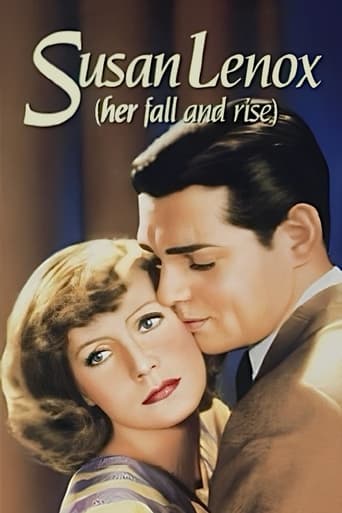vincentlynch-moonoi
I am, of course, jesting when I describe this as a silent film with dialogue. But that's just how I felt in the opening scenes (particularly) of the film. The over-acting of the principals reminded me precisely of the exaggerated motions that silent film actors usually went through. I almost deleted the film at the point, but stuck with it, and I'm glad I did. It was worth it, although I would hardly call this a great movie. Too creaky! Clark Gable has some good scenes here...and some not so good scenes, but I blame it more on the screen play and the director than I do on Gable. Gable's character couldn't quite decide whether to be the hero or a louse, and a little more consistency would have been helpful. However, this was one of Gable's first truly starring roles, and one can see why he hit it big.I know many will disagree with me, but once again I have to say -- what's the great attraction to Garbo. I certainly don't see it here.The story itself is rather daring. Garbo plays a woman who will do almost anything to reconnect with the man she loves. Today we'd probably say she was stalking Gable's character.Transitions here are terrible, and again, I blame the director for that. It's not a bad story, but after a while you get a little bored with Garbo's relentless pursuit of Gable. I wanted to yell at her (and him), "Get over it and move on!" Okay, I watched it once...but never again.
Neil Doyle
GRETA GARBO fans will undoubtedly forgive the screenplay which has Greta and CLARK GABLE romantically involved in an on again/off again relationship that is the basis for the whole movie. And, of course, Garbo's favorite cinematographer, William Daniels, is behind the camera making sure that she gets her fair share of lush close-ups.It starts out promisingly enough as a Gothic melodrama with Garbo fleeing the advances of a drunken fiancé ALAN HALE and rushing out into the storm. She seeks shelter in a barn but is discovered by CLARK GABLE who promptly takes a shine to her and invites her to take shelter under his roof. The opening scenes with Garbo and Gable have an innocent charm that makes them delightful to watch, with Gable giving a more natural performance than Garbo who already has a bag of transparent acting tricks.The plot thickens when Susan Lenox is forced to flee Gable's residence when her strict father and fiancé show up to bring her home. She ends up taking refuge on a circus train and ends up being "kept" by one of the managers. When she's reunited with Gable, it begins a series of misunderstandings. Garbo plays her role like the real diva she was, even pronouncing Gable's name--"Rodney"--in a melodramatic way.It's strictly downhill into pulp romance territory for the rest of the way. It's Gable who gives one of his most likable performances and sustains interest in the story's development--not Garbo.Summing up: Only for die-hard Garbo fans. Noteworthy for a very fine beginning which soon lapses into mediocrity.
dbdumonteil
Troubles never come singly,and in the short space of barely 75 minutes,the least we can say is that rain keeps falling over Garbo's head.The director treats of his heroine's childhood as a shadow show,a good idea and a way to sweeten the rather dense and eventful story.So dense it's sometimes hard to keep up with it.GB is a wretch,then a circus artist, a socialite,a hostess in a seedy African cabaret..Well it's melodrama!This is not as good as contemporary Stahl's best works though,because of the unsatisfying cutting. Long before "Ninotchka" Garbo laughs when she sees caviar .(it looks like buckshots!).This is not as much misogynist as they often say.Except for Gable's character and the man in the cabaret,all the males are infamous pigs whose only desire is to get the heroine in their bed.
dmwspace
This film is noteworthy because of the unique, mysterious, and wonderful screen presence of Greta Garbo. She is thoroughly convincing as the vulnerable young woman at the beginning of the film, and as her character becomes more worldly but still vulnerable she remains convincing. Occasionally she might lapse into acting that would seem to the modern viewer to be overly dramatic, but overall she is brilliant. Clark Gable is okay, but the construction of the film from a plot standpoint left something to be desired. Some things needed to be explained better. This seems to be a common problem with many early sound films as most of the 1928-31 sound films that I have seen are at times disjointed, leaving the viewer wondering why something occurred. That said, I recommend this film because of Garbo.


